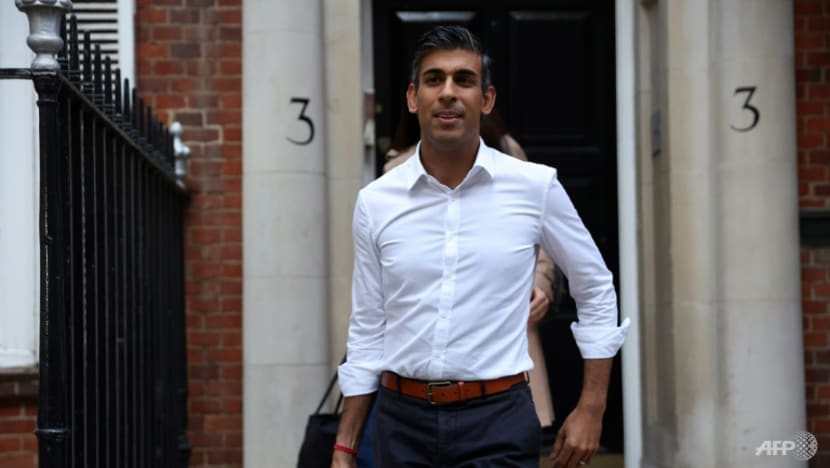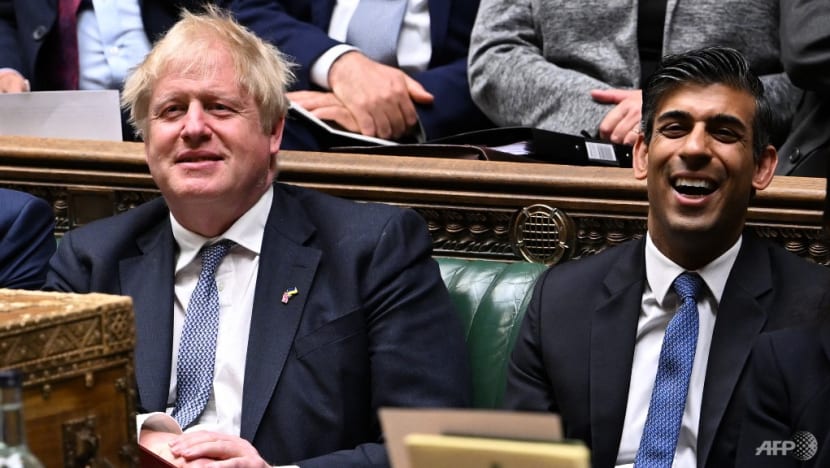Commentary: Rishi Sunak can restore sanity, but stability will be a harder slog
As Britain's new prime minister, the former chancellor is going to have to preside over a painful period of retrenchment, says the Financial Times' Robert Shrimsley.

LONDON: It may not have felt that way, but for Rishi Sunak getting there was the easy part.
After just seven years in parliament the former chancellor is Britain’s new prime minister, the third this year, his success owing much to his being more spectacularly and rapidly vindicated in his analysis of Liz Truss’ economic strategy than even her wildest critics could have imagined.
With neither of his rivals making it to a ballot, Sunak has won the job without a vote. Boris Johnson’s abandonment of the contest, either because he did not meet the nomination threshold, or possibly because while he just met it he could feel the tide was running away from him, is a relief.
The UK has had enough entertainment for a generation and now desperately needs a period of undramatic stable government.
It is striking to think that Sunak has become prime minister without once addressing voters. Too many Tories MPs framed the debate as being about who could restore Conservative fortunes rather than who might be best for the country.
This is not merely a constitutional gripe. Sunak faces huge issues and has offered no public indication of how he will confront them beyond what he said in the different circumstances of the last leadership contest.
Opposition parties know their demands for an election will be ignored so the failure to talk to anyone but the parliamentary selectorate is even more egregious. And this will matter because Sunak still faces significant internal opposition, despite his uncontested victory.
RESTORING POLITICAL AND ECONOMIC STABILITY
Having got the job, Sunak’s key task is to address two crises. One economic, one political - the two are directly related. The UK is paying a financial premium in the markets for its political turmoil. Without restoring political stability, he cannot tackle the economic issues.
Sunak may hope that his arrival reassures global investors that the UK has reverted to sensible, fiscally continent leadership. Yet the economic situation is dire and whatever he does is likely to be unpopular. He will have to oversee a painful period of retrenchment. A key issue will be setting the balance between tax rises and spending cuts.
Sunak has to reconcile his MPs and the country with this retrenchment. He is likely to agree with Jeremy Hunt that the energy rescue package should be reviewed and scaled back in the spring, but this too carries pain for some. Sunak has not publicly committed to keeping the chancellor in place but MPs want him to do so.
He also faces the problem of public services under immense strain and a wave of strikes over pay. Which way will he lean in the battle on whether to liberalise immigration? His economic instincts may be in favour, but Tory voters veer the other way and he has a complex electoral coalition to rebuild.

Yet all these complex and difficult issues require a Conservative party with the self-discipline to support hard choices.
Holding together the Tories’ 2019 electoral coalition in a period of retrenchment, inflation and possibly recession will be extremely difficult. In recent months, the Conservative party has looked almost ungovernable and he has many colleagues who openly loathe him, wrongly blaming him for Johnson’s downfall.
Even some of his supporters have warned they could sink his government if they think he is selling them out over Brexit and the Northern Ireland protocol.
This mistrust comes despite the fact that he was an original Brexit backer, a fact that should not be entirely forgotten when playing up his economic credentials. Brexit is one of the reasons for the UK’s economic weakness and for market concern. It has also left him with less money and so less financial room for manoeuvre.
There will be a caucus of opposition on any spending cuts, be they to overseas aid, defence or the uprating of benefits. The same will be true for tax rises.
A STEP BACK TO SANITY
Sunak’s victory is a step back to sanity but no one should be in any doubt about the scale of the challenges ahead. Like his predecessor, he finds himself with no money and no reliable majority. His personal wealth opens him to accusations of being detached from ordinary voters.
An early sign of his approach will be how much he shuffles his Cabinet. There is a stability argument for limited tinkering but he will want the best team he can assemble while avoiding Truss’ mistake of shutting out those who were not supporters.
As important is that, despite his two years as chancellor, Sunak is still a relative newcomer. He will be the least experienced prime minister of modern times. This was obvious in the errors that cost him his original place as heir apparent.
Holding on to a US green card and being wholly unprepared for the row over his wife’s “non-dom” status were signs of political naivety. MPs will worry that he lacks the instinct and skills of a political street fighter.
On the upside, he is serious and diligent and, unlike Truss, a gifted communicator. He will also seek to return the Tories to what was once a core principle: Being responsible stewards of the economy.
It is also an important moment for British society. On Deepavali, the UK got its first Hindu and first non-white prime minister. It is a profound statement about modern Britain and one of which his party ought to be proud.
While Labour, which is more committed to diversity schemes, has yet to elect anyone but a white man as leader, the Conservatives will have delivered both the first female and first non-white prime ministers.
Britons, be they Tory supporters or not, need this government to succeed in stabilising the country and the economy. It may be that the damage done by the Conservatives means the next election is already forfeited, though two years is a long time.
But Sunak and the Conservatives now owe it to the country to restore order, stability and the UK’s reputation in the world. Both the party and, more importantly, the country now need a government that does not treat the nation’s institutions, economy and standing like just one more political game.

















